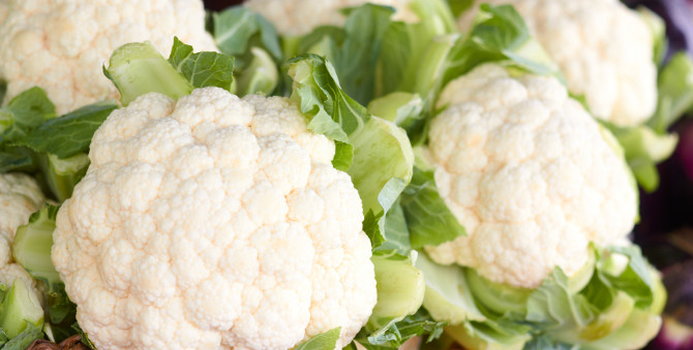While you more than likely have eaten cauliflower at some point in your life, you probably don't know much about its nutritional status. In order to determine whether or not this food is right for your family, you must learn about its carbohydrate, fiber and water content.
Carbohydrates
In general, cauliflower is composed almost primarily from carbohydrates. While carbohydrates have gotten a bad rap over the past few years, they are actually quite important for good health for a number of reasons. First, carbohydrates are one of the primary sources of energy that your body uses to help make it throughout the day. Without adequate carbohydrate consumption, you would experience feelings of fatigue, nausea and dizziness. Foods that are rich in carbohydrates are often touted as being to blame for the development of obesity. However, in reality, this couldn't be farther from the truth. Per gram, carbohydrates contain about four calories. Compare that to fat, which contains nine calories per gram. Therefore, foods that are rich in good carbohydrates, such as cauliflower, are actually relatively low in calories.
Fiber
Another important component of cauliflower is fiber. Fiber has no calories, and in fact cannot even be digested by the body. However, fiber is important for good health and optimal growth for a number of reasons. First, research has found that high fiber diets are effective in the treatment and prevention of a number of serious health conditions, including cardiovascular disease, stroke, and even some types of cancer. Specifically, fiber appears to be effective in the prevention of colon cancer. This is due to the fact that fiber is relatively porous, and when it moves through the digestive tract, it is therefore able to trap and excrete toxins that could otherwise lead to the development of cancer. Finally, fiber is important for people who are interested in maintaining their current weight or losing weight, due to its ability to promote feelings of satiety. This prevents overeating and snacking between meals, limiting high calorie intake.
Water
Finally, like most vegetables, cauliflower has a very high water content. Except for your bones and fat, your body is composed almost primarily from water. Therefore, it is no surprise that foods that contain high amounts of water help in the functioning of your body. Water is important not only in preventing dehydration, but in a number of other ways. First, being adequately hydrated is essential in the removal of toxins from your body. Next, without enough water, your skin, hair and nails can become dry and brittle. Finally, being adequately hydrated is essential for optimal athletic performance.
In general, cauliflower is a great vegetable that should be eaten on a regular basis. For best results, eat cauliflower raw, or cook it through boiling, baking or grilling. Avoid cauliflower that has been sauteed or fried. This will increase both the fat and calorie content of the vegetable.



